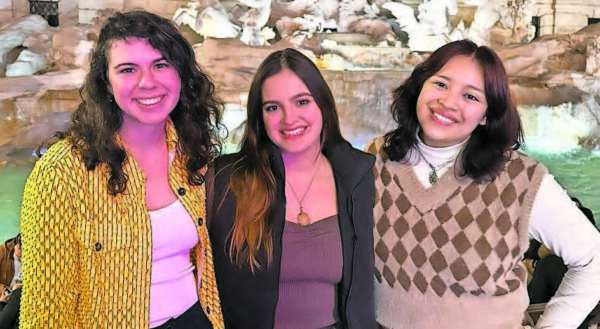
WASHINGTON — A group of recent graduates of St. John’s University in Queens learned about environmental activism from the ground up over the past two years.
In recent months they were involved in restoring a campus garden, while the previous year, they focused on planting ideas: writing about environmental concerns in their hometown publications and talking to state lawmakers about environmental efforts.
Both actions took cues from “Laudato Si’: On Care for Our Common Home,” the 2015 encyclical by Pope Francis that focuses on the environment and reminds readers of Church teaching on the need to care for creation.
The encyclical is being celebrated around the world with prayer services and seminars during Laudato Si’ Week, May 21-28, but for St. John’s University students Brooke Mosca, Sarah Quispe, and Cecilia Whelton, who graduated May 21, the encyclical’s message is not just relegated to one week. The pope’s message on the environment was something these three were very familiar with and worked to promote as members of the Laudato Si’ Advocates, an internship program through the U.S. Conference of Catholic Bishops.
In the program, they researched and discussed environmental and Catholic social justice issues that they were then encouraged to write about for publication or discuss with state lawmakers.
“The idea of “Laudato Si’ ” is for all of us to be stewards of the Earth and to take care of God’s creation,” said Mosca, a native of White Marsh, Maryland, who graduated with a degree in communication arts. She had letters to the editor published in her home state about efforts to preserve Maryland’s Chesapeake Bay.
Whelton, a native of Glen Ellyn, Illinois, who just graduated with a journalism degree, said her experience in the program reinforced her belief that stewardship of the environment is the responsibility of every Catholic.
Last year, in an opinion piece for the suburban Chicago news site The Daily Herald, she advocated for a change in water access in Illinois for the poor.
And Quispe, from Richmond Hill, Queens, who graduated with a degree in psychology, had an op-ed on transportation published in the Queens Chronicle and one on the New York-New Jersey Watershed Protection Act in the Gotham Gazette.
“We are challenged to make people aware that “Laudato Si’ ” is a letter to everyone, not just Catholics. It is a letter to you, your neighbors, your family, and everyone you know,” Quispe said. “To tackle something as widespread and dangerous as environmental degradation and the suffering it causes, we all need to work together by shifting the dialogue … regarding the environment.”
The three graduates, who spoke with The Tablet just days before their graduation, said the pope’s encyclical meant a lot to them, and they were particularly drawn to the connection of faith and the environment.
For Whelton, the faith aspect of looking at the environment ties into individual responsibility, pointing out that it’s not just corporations or billionaires who need to change but individuals who also need to act.
Mosca similarly appreciated the connection between the environment and faith, saying that as someone who always attended Catholic schools, she knew how religion intersects with modern life, but the pope’s encyclical went beyond making a connection; it had a “call to action within it,” she said, urging people to be stewards of creation.
And while many young people are already attuned to current environmental dangers and efforts, Quispe said they might be surprised to see that the Catholic Church has something to say about it.
She said it’s important to connect her own advocacy to her faith, adding that “‘important’ is honestly not a big enough word for this. It is critical; it is everything to me.”
But she also said she has found that being able to defend her beliefs without talking about her faith is also necessary because “we live in a secular state, and being able to defend policies in secular terms is important for effective advocacy.”
For all their work in writing articles for publications, the students found it difficult to get material published. They also said it was hard to get meetings with lawmakers, although they were able to speak with aides.
The second year of the program switched gears to service work, and the three students were involved with other campus students in restoring a campus garden that had suffered pandemic and post-pandemic neglect.
After raking, weeding, and planting seeds, the students held a rededication ceremony this spring for the garden, sprinkling holy water on seeds of newly planted carrots, onions, beets, radishes, zucchini, tomatoes, cucumbers, peppers, and Swiss chard. Quispe, who was recently hired to care for the garden and work on other campus sustainability projects this summer, said a prayer at the ceremony.
The garden supplies produce to St. John’s Bread and Life, a food pantry and soup kitchen in Brooklyn. Students have also been involved in trying to reestablish food composting at the school’s main dining hall.
In both the advocacy work and the gardening, the plan was to make a difference.
Quispe said the goal for the garden was to build something that went beyond their graduation: “to create something here that future students can be a part of.”
